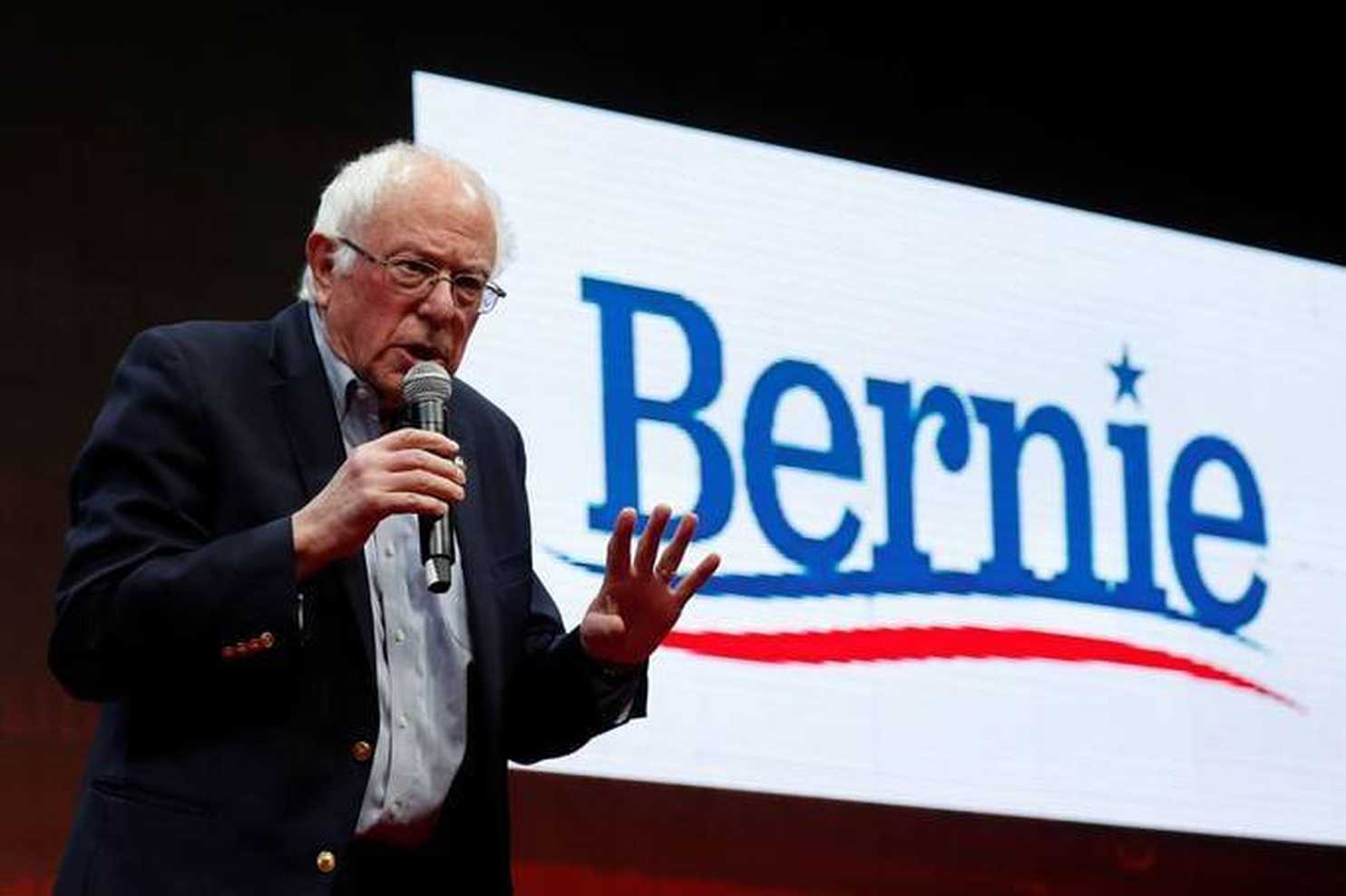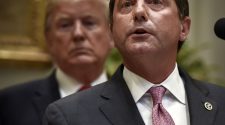U.S. Sen. Bernie Sanders (I-Vt.). (Shannon Stapleton/Reuters)
Ctrl + N
2020 presidential candidate Sen. Bernie Sanders (I-Vt.) is proposing breaking up Internet service providers such as AT&T and Comcast in his new plan to expand Internet access.
“Our tax dollars built the internet and access to it should be a public good for all, not another price gouging profit machine for Comcast, AT&T, and Verizon,” he wrote in the plan released Friday.
Sanders argues that high-speed Internet is “a basic human right” and that existing providers should be regulated by the government as a utility — similar to electricity. His plan would also provide $150 billion in grants and technical assistance for cities and municipalities to build their own publicly-owned networks as part of the Green New Deal infrastructure initiative.
Amazon, Google and Facebook have been familiar choices of corporate punching bags for Democrats this election cycle — but Sanders’s tough talk suggests that the Internet service providers may soon be another foil for liberals seeking to rein in corporate power.
If Sanders’s position gains traction, telecom giants could soon find themselves in a similar position to healthcare industry players fighting against Medicare-for-all or public option proposals popular on the trail.
“Internet, telecom, and cable monopolies exploit their dominant market power to gouge consumers and lobby government at all levels to keep out competition,” Sanders wrote.
Sanders makes the case that corporate consolidation has contributed to high prices for Internet and a lack of availability in some areas. He would require that all Internet service providers offer a “Basic Internet Plan” that “provides quality broadband speeds at an affordable price.”
Sanders, who has long called for breaking up monopolies, would bar service providers from also offering content, which could end up unwinding some significant telecom mergers. It could mark a major shake-up for companies such as AT&T — which recently acquired Time Warner, the owner of services including HBO and Warner Bros. Comcast could potentially have to divest from NBC Universal. Sen. Elizabeth Warren (D-Mass.) has also criticized AT&T’s merger with Time Warner.
Sanders is also taking aim at some of the companies’ practices that are unpopular with consumers. He’s seeking to eliminate hidden fees, including surprise billing. His plan would also require Internet and cable providers to clearly state the cost of service, ban unexpected rate increases and end service termination fees.
Broadband access hasn’t received much air time on the debate stage this election cycle, but that could change this month. The candidates are heading into primaries in Iowa and New Hampshire where there are rural areas with limited Internet choices. Other 2020 candidates have also released plans to expand broadband, but Sanders’s aggressive proposals could spark greater debate.
Warren proposed an $85 billion investment in public broadband earlier this year — only a fraction of the amount Sanders has proposed. South Bend, Ind., Mayor Pete Buttigieg has pitched a $80 billion “Internet for All” plan to build public options in the regions that private companies don’t cover. Former vice president Joe Biden has said he would invest $20 billion in rural broadband infrastructure. Sen. Amy Klobuchar (D-Minn.) outlined Internet access as a key focus of her infrastructure plan, saying she would provide greater incentives for existing providers to ensure underserved areas are covered.
Internet access could prove to be an issue that Democrats use to hammer the Trump campaign’s ability to keep its promises with rural voters. The Trump campaign in 2016 said it would deliver rural braodband as part of a broader infrastructure initiative, which has stalled in Congress.
“I see that the country of Iceland has all hooked up, and we’re not,” Klobuchar told Politico earlier this year when asked about Trump’s record.
BITS, NIBBLES AND BYTES

Facebook logos REUTERS/Johanna Geron/Illustration/File Photo
BITS: Facebook is confronting pressure from many directions to limit microtargeting of political ads. But politicians including Trump are avid users of these tools, creating high stakes as the company weighs changes to its policies, my colleague Craig Timberg reports.
Other tech companies’ recent changes to their own political ads policies are putting pressure on Facebook to reconsider its rules. But any changes at Facebook are expected to be less sweeping than those recently announced by Twitter and Google. One leading idea that Craig reports is being considered is setting a broader minimum size for microtargeted groups. Right now advertisers can target groups as small as 100 people. Facebook is considering limiting political ads to target a minimum of 1,000 or 10,000 people, which would somewhat increase their transparency.
That’s sure to upset some political operatives. They’ve become reliant on microtargeting to communicate messages not only to potential supporters but also to potential campaign donors.
Microtargeting has become an extremely popular tool in the corporate world to advertise products and services, but disinformation experts warn that it has unique dangers in political contexts. That’s because “no outside observer has a full view of the torrent of tailored messages being delivered,” Craig writes. They can’t be scrutinized as much as other forms of advertising seen by a broader audience, such as billboards or TV ads. The narrow targeting threatens to fracture political understanding more than the traditional partisan divide, some experts warn.
“Instead of two Americas, you’re potentially looking at hundreds of thousands of Americas,” Alex Stamos, the former Facebook security chief, now head of the Stanford Internet Observatory, which studies disinformation campaigns, told Craig. “I don’t think our democracy can survive that kind of Balkanization of the electorate.”
Facebook spokesman Kevin McAlister told Craig that Facebook is continuing to weigh its options. “We are looking at different ways we might refine our approach to political ads. We’re continuing to collect feedback and are considering the options,” he said.

U.K. Prime Minister Boris Johnson. (Hollie Adams/Bloomberg News)
NIBBLES: Reddit says an account leaking unverified U.K. trade documents on the platform belongs to a broader foreign influence campaign originating from Russia, raising concerns of foreign influence just days before the United Kingdom’s national election. Reddit removed the account that leaked the documents, as well as 61 other accounts and one forum that the company said violated its rules and manipulated votes to promote the documents.
“This group provides us with important attribution for the recent posting of the leaked UK documents, as well as insights into how adversaries are adapting their tactics,” Reddit wrote in a blog post.
Reddit’s confirmation connects the leaked documents with a Russian campaign dubbed “Secondary Infektion” spotted on Facebook earlier this year by the Atlantic Council. It’s still unclear how the documents were obtained. Researchers at Graphika first identified the campaign, as I reported last week.
A British government representative told NBC News Sunday that “online platforms should take responsibility for content posted on them, and we welcome the action Reddit have taken.”

The Amazon logo. (Thomas Samson/AFP/Getty Images)
BYTES: The Trump administration is weighing adding some of Amazon’s overseas operations to a list of marketplaces known for counterfeits, the Wall Street Journal’s Timothy Puko and Alex Leary report. The decision has yet to be finalized, but a public shaming could deal a serious blow to Amazon as it also faces scrutiny from lawmakers and regulators over its counterfeit problems. (Amazon CEO Jeff Bezos also owns The Washington Post.)
The U.S. Trade Representative’s Office has historically issued its “Notorious Markets” list to pressure other countries to crack down on counterfeits. Proponents of including the e-commerce giant on the list cited reporting about Amazon’s failure to rein in counterfeit products from its third-party sellers. The products sometimes put American consumers at risk.
The office rarely targets U.S. companies. “USTR is going to have to make a very strong case to put what looks like an American company on this list,” said Claire Reade, senior counsel at Arnold Porter and former assistant U.S. trade representative for China affairs. “Otherwise I think the risks to USTR [and the list] are high, because then its credibility comes into question.”
WIRED IN
Uber CEO Dara Khosrowshahi spoke to The Washington Post’s Geoffrey Fowler about the company’s first-ever safety study disclosing sexual assaults on rides.
PUBLIC CLOUD
— News from the public sector:

President Trump is defending Google, Facebook and other big tech companies he’s repeatedly railed against when it comes to France’s digital tax, a position that underscores how Trump’s policies on tech don’t always match his fiery, antagonistic rhetoric.
The Hill
PRIVATE CLOUD

A Sony PlayStation controller. (Patrick T. Fallon/Bloomberg News)
BYTES: Predators are targeting children in online video games and associated chat apps, Nellie Bowles and Michael H. Keller at the New York Times report. Some companies are trying to protect children by separating users from messaging based on age, but many companies appear to be turning a blind eye to growing concerns from parents and law enforcement.
The ubiquity of the gaming and chat apps has led to an increase in “sextortion” crimes, where predators manipulate victims into sending compromising photos that they can then use to extort more sexual images. Predators threaten victims with exposure or even physical harm to them or their families if they don’t comply. One New Jersey sting operation made dozens of arrests of predators who had used a variety of games, including Fortnite, Minecraft and Roblox.
Epic Games, the creator of Fortnite, did not respond to requests from the Times seeking comment on its policies to prevent abuse. Microsoft, which owns Minecraft and Xbox Live, says it’s working on automated technology to detect potential grooming and child abuse.
In many cases, the suspects moved conversations from games to chat apps, such as Discord. Discord reviews chats flagged as high risks, but does not automatically monitor conversations for potential abuse, citing potential privacy violations. Predators also use Instagram, which allowed strangers to send private messages to minors until last week. In-game chat functions can prove just as hard to monitor because many relying on audio rather than text can be scanned using automated systems.
— News from the private sector:
#TRENDING
— Tech news generating buzz around the Web:

As North American governments struggle to fight it, the robocall epidemic could already be changing how we use our phones. If you’ve stopped picking up, you’re not alone.
Vice
CHECK-INS
— Coming up:
- The Senate Judiciary Committee will host a hearing, “Encryption and Lawful Acess: Evaluating Benefits and Risks to Public Safety and Privacy,” on Tuesday at 10 a.m.















